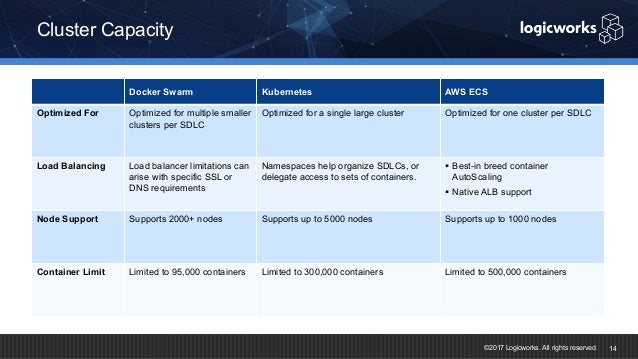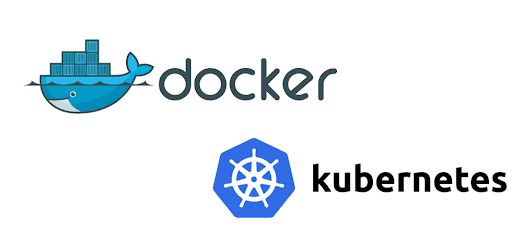

- DOCKER SWARM VS KUBERNETES VS ECS PORTABLE
- DOCKER SWARM VS KUBERNETES VS ECS SOFTWARE
- DOCKER SWARM VS KUBERNETES VS ECS SERIES
DOCKER SWARM VS KUBERNETES VS ECS SOFTWARE
You see, every VM you have running must have its own operating system, all libraries, and application binaries - as you can expect, this amount of software can eat up gigabytes of memory and storage. Both allow users to create and spin up an image, and work on it while it is in an isolated environment.īut perhaps the biggest distinction containers have over VMs is how they lean towards building and launching applications efficiently. You're probably wondering by now what makes containers different from virtual machines. This kind of modular design to software containerization is an efficient way to create microservice architectures. Software containers can interact with each other for maximum efficiency-for example, one container can provide a database service, which an application on a separate can access through a programmed port. Software containers, however, can be programmed to do both, and then some. Shipping containers can't 'talk' to each other, nor can they depend on one another to perform certain processes. Of course, the analogy between software and shipping containers can only go so far. RAM, storage, network bandwidth, and CPU) each container can use, preventing them from choking out critical applications. These systems can also limit the number of system resources (e.g. Sysadmins can use groups and Linux containers (LXC) to prevent containers from "leaking," ensuring that memory contents, namespaces, libraries, and data files are isolated in each individual container. You can even run multiple containers on one machine, allowing you to maximize all available resources. For starters, it allows software engineers to spin up individual containers to test and isolate issues, all while knowing the container is 100% identical to whatever is already being deployed.Īs you can probably see, the ability of containers to run on any machine and environment makes them a very efficient way to build and manage applications.

This kind of consistency offers several benefits. The process of "loading" the software container involves defining what it needs for the application to function, such as configuration files, libraries, operation systems, and application binaries among other things that form a technology stack.Īfter defining the container, its image is used to create multiple containers that are compatible with any ecosystem, from a sysadmin's work laptop to a developer's test rig, or the onsite product server or cloud data center, without modifying the container's contents.

The rich functionality, highly capable APIs, and simple tools of containers and container orchestration makes this technology a favorite among DevOps admins, who use it to bolster their Continue Integration and Delivery workflows.īut what exactly are containers and how are they "orchestrated"?
DOCKER SWARM VS KUBERNETES VS ECS SERIES
Orchestration tools also let sysadmins manage the creation, upgrade, and availability of multiple containers in an IT infrastructure.įinally, the orchestration process lets users control how several containers are connected to create complex applications from a series of microservice containers.
DOCKER SWARM VS KUBERNETES VS ECS PORTABLE
Orchestration solutions allow you to execute a single command to create a self-contained and portable sandbox, or build a container image that lets multiple staff members across development, operations, test, and support teams work and experiment in a clone environment. Note: ensure to redact or obfuscate all confidential or identifying information (eg.Whether you want to try a new database program on your workstation, or want duplicates of your application stack across different environments, you can do these and more with the help of container orchestration tools. News, articles and tools covering Amazon Web Services (AWS), including S3, EC2, SQS, RDS, DynamoDB, IAM, CloudFormation, Route 53, CloudFront, Lambda, VPC, Cloudwatch, Glacier and more.


 0 kommentar(er)
0 kommentar(er)
